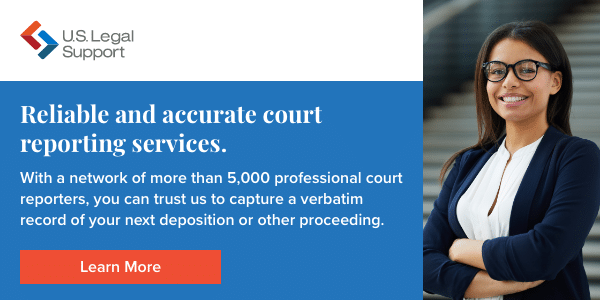Legal Transcription vs Court Reporting: What’s the Difference?

A verbatim, accurate transcription is critical for depositions, trials, and other legal proceedings. The word choice of a single witness or attendee can affect a negotiation and settlement, trial strategy and outcome, witness impeachment, or even future law based on precedent.
Court reporters and legal transcriptionists both play a key role in producing these important documents—whether for trials and depositions or in business or other settings—but the professions are distinctly different.
Let’s take a look at legal transcriptionist vs court reporter in terms of responsibilities, environments, and skill sets.
What Is Legal Transcription?
Transcribing is the process of converting spoken words to a text document, and it’s a mainstay within the legal profession as well as several other industries that require formal documentation of meetings or events.
There are many types of legal transcription, but the three most important aspects of legal transcription are:
- Legal record – While a record may have to do with a civil or criminal trial, legal records are also used for organizational and business purposes or in any instance where an official record is required, advised, or useful.
- Verbatim – Legal transcription is usually synonymous with verbatim transcription, which is the exact capture of every verbal and non-verbal sound. This leads to records that include filler words like “um,” stutters and false starts, and laughter, coughs, or ambient noises.
- Recorded source – A legal transcriptionist works from an audio or video file, using controls to easily stop, start, and rewind the recording at the pace needed to type what they hear. While they typically use specialty software, headphones, and a foot pedal device, they input words on a regular keyboard and computer without involving shorthand.
What Is Court Reporting?
Court reporting is one of the oldest professions. Once ancient civilizations came up with the concept of a trial, officiants understood the need for a formal record of testimony, questions, and outcomes.
Spoken language is significantly faster than writing words—especially when you go all the way back to inscribing on clay tablets, but even a fast typist on today’s computers isn’t fast enough.
Shorthand systems solve this challenge, allowing court reporters to capture phrases, words, and phonetic sounds rather than individual characters. Today, these systems include devices such as a stenotype machine or voice writer combined with software that converts device input to written text.
While court reporters generate transcripts, they also have an active role in official legal proceedings. A professional, skilled court reporter is trained to:
- Utilize stenography, voice writing, or digital reporting to capture a live proceeding
- Swear in deponents or witnesses and begin the official record
- Ensure communication is vocalized clearly for the record
- Provide realtime transcription when requested
- Readback testimony during court proceedings
- Review, finalize, and distribute an official transcript that is entered into the legal record
The Difference Between Legal Transcription vs Court Reporting
Court reporting and legal transcription services have some overlap, however, attorneys and law firms still use both types of professionals to get their work done.
Here are some basics about court reporters:
- Licensing: Must be licensed in most states including notary public status
- Education: Requires court reporting associate’s degree or certificate program
- Pay (average annual, nationwide): $76,0801
- Formality: Professional even for remote participation, frequent public appearances
Court reporters are usually certified based on their methodology from one of these organizations:
- National Court Reporters Association (NCRA)2
- National Verbatim Reporters Association (NVRA)3
- American Association of Electronic Reporters and Transcribers (AAERT)4
- United States Court Reporters Association (USCRA)5
However, how to become a legal transcriptionist is different and may require the following:
- Licensing: None
- Education: High school plus on-the-job learning or 3 – 6 month vocational training
- Certification: Optional AAERT certification (Certified Electronic Transcriber)4
- Pay (average annual, nationwide): $66,7106
- Formality: Usually informal, “behind the scenes”, often working from home
How to Pick the Best Service for You
Who you hire depends on your needs, so be clear in communicating what you require if you work with an agency or provider to secure a transcriptionist or reporter.
Engage a court reporter if you need a court official who can:
- Facilitate a verbatim recording during a deposition, hearing, trial, or other proceeding
- Swear in witnesses
- Provide realtime transcription during a live legal proceeding
- Facilitate official on- and off-the-record status
- Request clarity or repetition on the spot to ensure a watertight verbatim transcript
- Read back earlier parts of the legal transcript for clarity during a complex live event
Alternatively, a legal transcriptionist is ideal to:
- Transcribe an audio or video recording
- Proofread, format, or otherwise review transcript drafts
Get Connected to Experienced Transcription and Court Reporting Professionals
Now that you understand the difference, are you ready to arrange a transcriptionist or court reporter for your next legal proceeding?
For nearly 30 years, U.S. Legal Support has provided litigation support services including court reporting and transcription from our pool of professionals across the country. Plus, we offer record retrieval and analysis, litigation consulting, interpreting and translation services, and more.
Contact our team to discuss your transcription, court reporting, and other litigation support needs.
Sources:
- Zippia. Court Reporter Salary. https://www.zippia.com/court-reporter-jobs/salary/
- National Court Reporters Association (NCRA). NCRA Certifications. https://www.ncra.org/certification/NCRA-Certifications
- National Verbatim Reporters Association (NVRA). NVRA Certifications. https://nvra.org/page/Certifications
- American Association of Electronic Reporters and Transcribers (AAERT). Certification Program. https://aaert.org/become-certified/certification-program/
- United States Court Reporters Association (USCRA). FCCR Certification. http://www.uscra.org/fcrr-certification/
- ParaLegalEDU.org. Legal Transcriptionist: What it is & How to Become One. https://www.paralegaledu.org/blog/legal-transcriptionist/

Editoral Policy
Content published on the U.S. Legal Support blog is reviewed by professionals in the legal and litigation support services field to help ensure accurate information. The information provided in this blog is for informational purposes only and should not be construed as legal advice for attorneys or clients.


